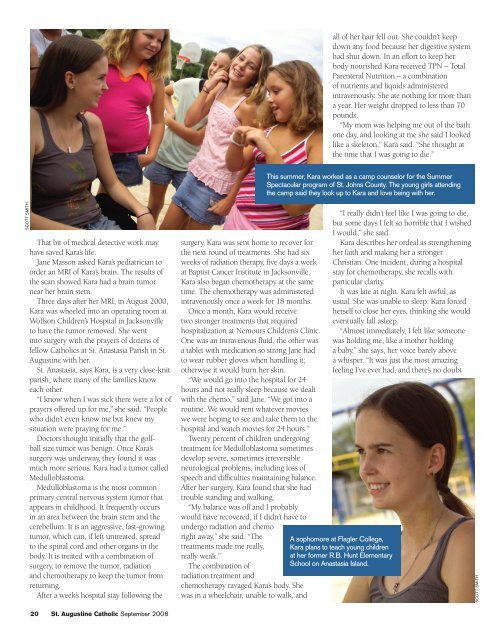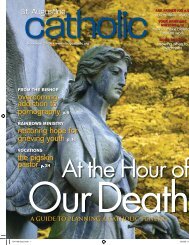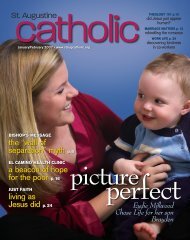September - St. Augustine Catholic
September - St. Augustine Catholic
September - St. Augustine Catholic
You also want an ePaper? Increase the reach of your titles
YUMPU automatically turns print PDFs into web optimized ePapers that Google loves.
all of her hair fell out. She couldn’t keep<br />
down any food because her digestive system<br />
had shut down. In an effort to keep her<br />
body nourished Kara received TPN – Total<br />
Parenteral Nutrition – a combination<br />
of nutrients and liquids administered<br />
intravenously. She ate nothing for more than<br />
a year. Her weight dropped to less than 70<br />
pounds.<br />
“My mom was helping me out of the bath<br />
one day, and looking at me she said I looked<br />
like a skeleton,” Kara said. “She thought at<br />
the time that I was going to die.”<br />
This summer, Kara worked as a camp counselor for the Summer<br />
Spectacular program of <strong>St</strong>. Johns County. The young girls attending<br />
the camp said they look up to Kara and love being with her.<br />
SCOTT SMITH<br />
That bit of medical detective work may<br />
have saved Kara’s life.<br />
Jane Masson asked Kara’s pediatrician to<br />
order an MRI of Kara’s brain. The results of<br />
the scan showed Kara had a brain tumor<br />
near her brain stem.<br />
Three days after her MRI, in August 2000,<br />
Kara was wheeled into an operating room at<br />
Wolfson Children’s Hospital in Jacksonville<br />
to have the tumor removed. She went<br />
into surgery with the prayers of dozens of<br />
fellow <strong>Catholic</strong>s at <strong>St</strong>. Anastasia Parish in <strong>St</strong>.<br />
<strong>Augustine</strong> with her.<br />
<strong>St</strong>. Anastasia, says Kara, is a very close-knit<br />
parish, where many of the families know<br />
each other.<br />
“I know when I was sick there were a lot of<br />
prayers offered up for me,” she said. “People<br />
who didn’t even know me but knew my<br />
situation were praying for me.”<br />
Doctors thought initially that the golfball<br />
size tumor was benign. Once Kara’s<br />
surgery was underway, they found it was<br />
much more serious. Kara had a tumor called<br />
Medulloblastoma.<br />
Medulloblastoma is the most common<br />
primary central nervous system tumor that<br />
appears in childhood. It frequently occurs<br />
in an area between the brain stem and the<br />
cerebellum. It is an aggressive, fast-growing<br />
tumor, which can, if left untreated, spread<br />
to the spinal cord and other organs in the<br />
body. It is treated with a combination of<br />
surgery, to remove the tumor, radiation<br />
and chemotherapy to keep the tumor from<br />
returning.<br />
After a week’s hospital stay following the<br />
surgery, Kara was sent home to recover for<br />
the next round of treatments. She had six<br />
weeks of radiation therapy, five days a week<br />
at Baptist Cancer Institute in Jacksonville.<br />
Kara also began chemotherapy at the same<br />
time. The chemotherapy was administered<br />
intravenously once a week for 18 months.<br />
Once a month, Kara would receive<br />
two stronger treatments that required<br />
hospitalization at Nemours Children’s Clinic.<br />
One was an intravenous fluid, the other was<br />
a tablet with medication so strong Jane had<br />
to wear rubber gloves when handling it;<br />
otherwise it would burn her skin.<br />
“We would go into the hospital for 24<br />
hours and not really sleep because we dealt<br />
with the chemo,” said Jane. “We got into a<br />
routine. We would rent whatever movies<br />
we were hoping to see and take them to the<br />
hospital and watch movies for 24 hours.”<br />
Twenty percent of children undergoing<br />
treatment for Medulloblastoma sometimes<br />
develop severe, sometimes irreversible<br />
neurological problems, including loss of<br />
speech and difficulties maintaining balance.<br />
After her surgery, Kara found that she had<br />
trouble standing and walking.<br />
“My balance was off and I probably<br />
would have recovered, if I didn’t have to<br />
undergo radiation and chemo<br />
right away,” she said. “The<br />
treatments made me really,<br />
really weak.”<br />
The combination of<br />
radiation treatment and<br />
chemotherapy ravaged Kara’s body. She<br />
was in a wheelchair, unable to walk, and<br />
“I really didn’t feel like I was going to die,<br />
but some days I felt so horrible that I wished<br />
I would,” she said.<br />
Kara describes her ordeal as strengthening<br />
her faith and making her a stronger<br />
Christian. One incident, during a hospital<br />
stay for chemotherapy, she recalls with<br />
particular clarity.<br />
It was late at night. Kara felt awful, as<br />
usual. She was unable to sleep. Kara forced<br />
herself to close her eyes, thinking she would<br />
eventually fall asleep.<br />
“Almost immediately, I felt like someone<br />
was holding me, like a mother holding<br />
a baby,” she says, her voice barely above<br />
a whisper. “It was just the most amazing<br />
feeling I’ve ever had, and there’s no doubt<br />
A sophomore at Flagler College,<br />
Kara plans to teach young children<br />
at her former R.B. Hunt Elementary<br />
School on Anastasia Island.<br />
SCOTT SMITH<br />
20 <strong>St</strong>. <strong>Augustine</strong> <strong>Catholic</strong> <strong>September</strong> 2006<br />
SA0906 layout.indd 20<br />
8/4/06 8:39:08 AM
















